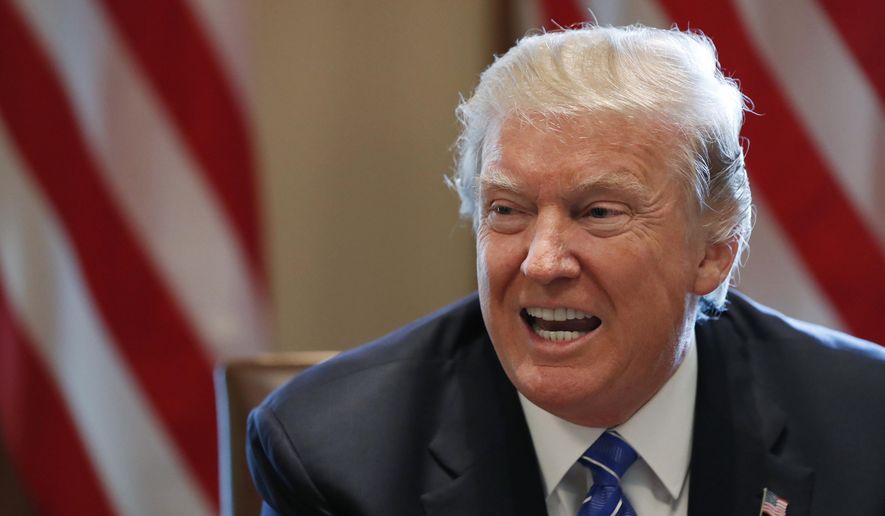President Trump’s backers are not balking at his deal making with Democrats or worried that it made Senate Minority Leader Charles E. Schumer too powerful, convinced that all of Mr. Schumer’s newfound bargaining power is derived from the president and he can revoke it whenever he chooses.
The president began haggling over tax reform with key Senate Democrats at a White House dinner Tuesday, seeking bipartisan buy-in for a major overhaul aimed at simplifying the tax code and slashing rates to let Americans keep more of their own money.
Tax reform tops the president’s legislative agenda and he is turning to Democrats to get it done.
“On issues ranging from national security to hurricane relief to keeping our government functioning, the president is reaching across the aisle to cut deals that help the American people,” said White House press secretary Sarah Huckabee Sanders. “The president truly believes, as he often says, that in order to succeed and grow, we must work as one team, one people and one American family.”
Mr. Trump rankled Republican leaders last week when he struck his first major deal with Mr. Schumer and House Minority Leader Nancy Pelosi, agreeing to a short-term increase in the debt limit and a spending bill to keep the government open in exchange for emergency funding for the federal response to the recent hurricane disasters.
Photos of Mr. Trump and Mr. Schumer exchanging broad smiles and embracing in the Oval Office when they made the deal underscored concerns in the GOP establishment that the president had ceded to much power to the fellow New Yorker.
Not for Mr. Trump’s conservative supporters.
“He’s a non-status quo president,” said Rick Manning, president of Americans for Limited Government. “Trump has all the power. Schumer’s power is given to him by Trump and he can take it back at any time.”
Republican pollster Jim McLaughlin said Mr. Schumer and his Democrats also are under pressure to make deals after their campaign to “resist” Mr. Trump at every turn only angered voters who want Washington to get things done.
“They are seeing that their brand is really taking a hit because people are saying ’a pox on both their houses’ right now. It’s in their interest,” he said. “It’s just like what Reagan used to do. A lot of it is being driven by President Trump and the White House because they want to get things done on the economy and they want to get things done on immigration.”
Senate Majority Leader Mitch McConnell, Kentucky Republican, also has been blamed for empowering Mr. Schumer by refusing to change the chamber’s filibuster rules, which allowed a handful of Democrats to thwart Mr. Trump’s legislative agenda.
Mr. Trump has repeatedly called for Senate Republicans, who hold a thin 52-48 majority in the 100-member chamber, to eliminate filibuster rules that require 60 votes to advance most legislation.
Mr. McConnell and other GOP leaders viewed the rule change as a heresy against Senate tradition.
For tax reform, Senate Republican are expected to use special budget rules known as reconciliation to pass it with just 51 votes. But any Democratic support would significantly strengthen Mr. Trump’s hand.
Mr. Trump began the negotiation over dinner with three Senate Democrats up for reelection next year in states he won by wide margins: Heidi Heitkamp of North Dakota, Joe Donnelly of Indiana and Joe Manchin of West Virginia.
Out of 48 Senate Democrats, they were the only three not to sign onto an Aug. 1 letter to Mr. Trump demanding that tax reform not give tax cuts to the top 1 percent of earners, not get passed with budget reconciliation rules and not add to the deficit.
They also face voters at home who largely support tax reform, especially tax cuts that fuel job growth and put money in their pockets. And that make the senators willing to make a deal with Mr. Trump.
The other dinner guests are Republicans: Orrin Hatch of Utah and Patrick J. Toomey of Pennsylvania, the chairmen respectively of the Senate Finance Committee and its subcommittee on taxation.
Meanwhile, Mr. Schumer stuck to his demand that the wealthiest 1 percent of Americans — those earning more than $385,000 a year — don’t get a tax cut.
The issue sharply divides Democrats from Republicans and is destined to dominate the tax debate.
“It’s middle-class Americans, not those in the 1 percent, who deserve tax relief. So we Democrats will not go along with a tax plan that includes a tax cut for those who need it least,” Mr. Schumer said in a conference call with reporters.
Mrs. Sanders said the president intends to bridge the divide.
“The president, I think, has demonstrated, both in his business world and as president, that he can make deals. And that’s certainly what he’s looking to do,” she said. “He’s going to work hard to make sure that we get the best deal possible on tax reform. I think that starts with things like tonight, having this conversation and moving that ball forward, working bipartisan support from both sides.”
• S.A. Miller can be reached at smiller@washingtontimes.com.




Please read our comment policy before commenting.